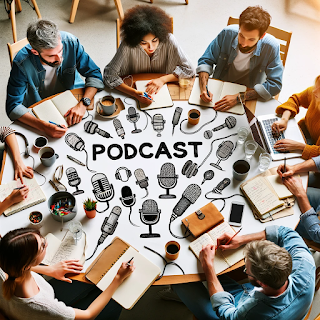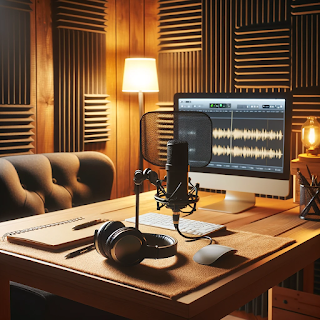Podcasting 101: Starting Your Own Successful Podcast – A Beginner's Guide
Podcasting has witnessed an extraordinary surge in popularity, emerging as a compelling platform that uniquely blends storytelling, insightful sharing, and global audience connection. If you're on the cusp of starting your own podcast, you're not just beginning a new venture, but embarking on a thrilling adventure. This guide is meticulously crafted to provide you with an all-encompassing overview, ensuring you are well-equipped for the journey of launching and nurturing a podcast that not only resonates with listeners but also stands out in the ever-expanding podcasting universe.
Understanding the Podcast Landscape
1. The Rise of Podcasting: Podcasting has grown into a lively and important form of media that attracts millions of viewers around the world who want to learn, have fun, and get ideas. This platform is very flexible, and it gives people a unique chance to find their own area and share their voice with a global audience that wants real and interesting material. Podcasting is a great example of how digital stories and community building can work because it can reach a lot of people and still feel personal.
2. Why Podcast? Podcasts are unique because they let you connect with your audience in a very personal way. They are very convenient for viewers because they can tune in on their way to work, while working out, or even while going about their daily lives. Podcasts are easy for anyone to reach, which makes them different from other digital and social material that usually requires more work. Additionally, podcasts are perfect for going into great detail about a subject, allowing for in-depth study and conversation. This level of detail and the host's personal touch make the experience more personal and interesting for viewers, creating a sense of community and connection that is hard to find in other forms.
Planning Your Podcast
1. Define Your Niche: Finding your niche is one of the most important things you can do to make your show successful. You could write about a lot of different things in this area, from cooking to reviewing high-tech gadgets. It is very important that the niche you choose is both something you are really interested in and something you are very good at. By connecting your podcast to both your interests and what you know, you build a base that is real and interesting, which is important for keeping your audience interested.
2. Know Your Audience: When you're podcasting, it's very important to really understand your viewers. Before you can really understand someone, you need to dig deep into their hobbies and traits. What draws them in? What are the specifics of their age, background, and way of life? You can make a podcast that not only reaches your audience but also connects with them deeply by making sure that your material fits perfectly with their needs, tastes, and the very pulse of their daily lives.
3. Set Clear Goals: Are you trying to raise awareness, make people laugh, or inspire them? It is very important to set clear goals in order to create material that is both focused and emotionally powerful. Being clear on your goal will help you write episodes that really connect with your listeners, making sure that every podcast is an important and memorable experience.
Technical Setup
1. Equipment Basics: If you want to start podcasting, you need at least a good microphone, dependable headphones, and a computer that can handle it. These are the basic things that make sure the sound is clear and the process runs smoothly. As your podcast grows and your audience grows, you'll be able to change to better tools, which will improve the quality of your podcast and the experience of your listeners. This slow but steady investment in technology not only makes your sound better, but it also shows that you want to grow as a podcaster.
2. Recording Software: A plethora of recording software options, both free and premium, are at your disposal. It's essential to select one that not only aligns seamlessly with your technical needs but is also intuitive to use. This choice will greatly influence the efficiency and quality of your recording process, so take the time to find software that feels like a natural extension of your creative workflow.
3. Creating a Recording Space: It is very important that the place where you record is quiet and free of sounds. A small investment in simple insulation can make a huge difference in how good your podcast sounds. This care for acoustics turns a simple recording space into a studio that sounds like it was made by professionals. This will make sure that the sound your audience hears is clear and interesting.
Crafting Your Content
1. Develop a Format: Figure out what your podcast will be about: interesting interviews, insightful one-person comments, or a lively mix of the two? It is very important to carefully plan how long and how often your attacks will happen. This planned method will not only make your podcast more consistent, but it will also make sure that your listeners know what to expect, which will make the experience better for them.
2. Creating Engaging Content: Your material needs to interest, teach, and connect with people. Use the art of storytelling to create stories that keep your listeners interested and turn each show into a trip that teaches and entertains them. This way of doing things makes sure that your podcast doesn't just share information; it produces an experience that keeps people looking forward to each new episode.
3. Preparing for Interviews: If your podcast style includes conversations, it's important to plan ahead. Spend some time getting to know your guests by learning about their past and what they can do. It is important to have a well-thought-out list of questions ready. This planning not only shows that you are professional, but it also helps you lead a more interesting and thought-provoking talk that keeps your audience's attention.
Branding and Marketing
1. Naming Your Podcast: The name of your podcast should be catchy, relevant, and easy to remember. It should be a vivid picture of what your podcast is all about. It's important that this title sums up the main idea of your podcast and gives potential viewers a clear, welcoming look into the world you've made.
2. Designing Your Artwork: Create stunning artwork for your podcast that not only draws people in but also fits with the theme of your show. This piece of art should be more than just pretty; it should show potential viewers a lively, inviting window into the unique atmosphere and personality of your podcast, making them want to tune in right away.
3. Building an Online Presence: Use social media to your advantage, make a website just for your show, and use email messages as important ways to get the word out. Not only can you stream your show on these platforms, but they can also help you build a strong community. Using these platforms to interact with your audience creates a two-way conversation that improves their experience and raises the profile of your show in the digital world.
Launching Your Podcast
1. Recording and Editing: Start by recording your first shows, making sure that each one fits with the overall tone of your podcast. After recording, carefully edit them to make them clearer and better overall. You might want to add music to these shows to make them more interesting and personal, and to make sure that your fans are hooked from the start.
2. Hosting and Distribution: Choose a strong podcast hosting service that will not only store your audio files safely but also send them automatically to popular podcast sites like Google Podcasts, Apple Podcasts, and Spotify Podcasts. This choice is very important if you want your podcast to reach a lot of people and be easy to find on all the famous listening platforms.
3. Launch Strategy: When you first start your podcast, you might want to release more than one episode. This method lets listeners dive right into your content, which makes it more likely that they'll become hooked and subscribe. Also, use all the ways you can to promote your podcast, such as social media, email newsletters, and even cross-promoting with other podcasters or leaders in your field. This approach for promoting on multiple channels makes sure that more people see it and gets the attention of potential viewers on a number of platforms right from the start.
Growth and Monetization
1. Consistency is Key: Regular uploads are crucial. Stick to a schedule to keep your audience engaged.
2. Engage with Your Audience: Encourage listener feedback and incorporate it into your episodes. Engaging with your audience builds a community.
3. Monetization Strategies: As your podcast grows, explore monetization options like sponsorships, advertisements, and merchandise.
Navigating Challenges
1. Overcoming Technical Hurdles: Technical issues are inevitable. Be patient, and don't hesitate to seek help or resources online.
2. Dealing with Plateaus: Podcasting growth can sometimes reach a plateau, a normal stage where listener growth and interest levels level off. When this happens, it's important to give your show new life. To bring this back to life, try out different types of content—for example, adding live-streamed shows, accepting questions from listeners, or adding themed miniseries. Also, it can be very helpful to rethink and come up with new marketing strategies. Explore new social media sites to promote your show, work with other podcasters to do cross-promotion, or attend community events to reach more people. Trying new things like these breaks up the routine and can help you get new listeners while keeping the ones you already have interested.
3. Staying Motivated: Podcasting requires a lot of dedication because planning, recording, and editing episodes can take a lot of time. It's important to keep your enthusiasm up by often remembering the reason you started blogging in the first place. No matter how small the achievement, whether it's finishing a show, getting good feedback, or hitting a new audience milestone, it should be celebrated. These successes are not only steps toward your bigger goal, they are also very important for keeping your motivation and drive alive. Accepting the process and noticing your success, even in the smallest ways, can be very satisfying and inspiring. It can help you stay focused and inspired on this creative project.
Starting a podcast can be a rewarding venture. It requires dedication, creativity, and a willingness to learn and adapt. By understanding your audience, delivering consistent and engaging content, and effectively utilizing marketing strategies, you can grow a successful podcast. Remember, every popular podcaster started with a single episode, so start yours today and enjoy the journey!
This comprehensive guide provides a basic roadmap for anyone looking to start a podcast. The world of podcasting is dynamic and constantly evolving, so stay curious, keep learning, and let your voice be heard. Happy podcasting!



